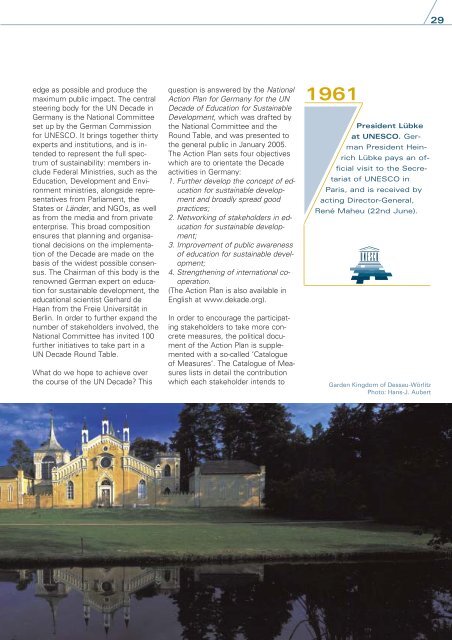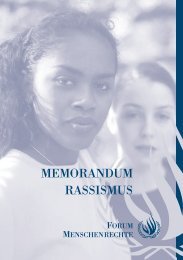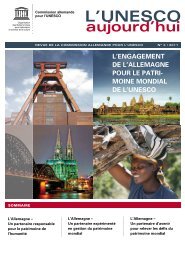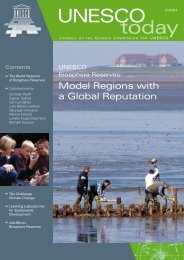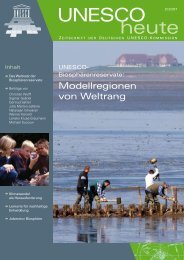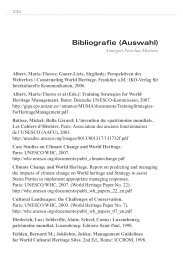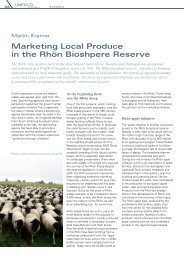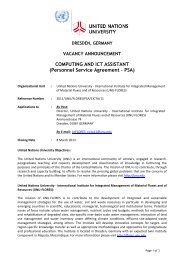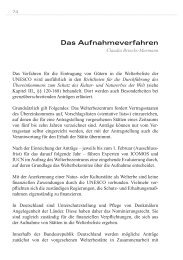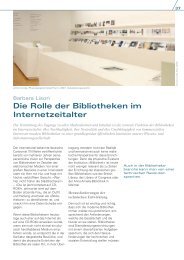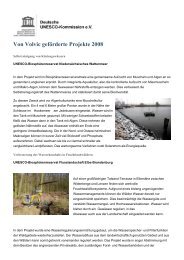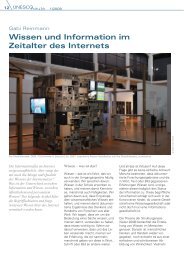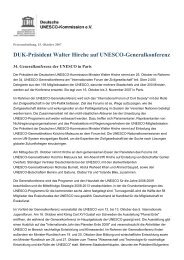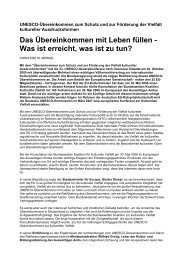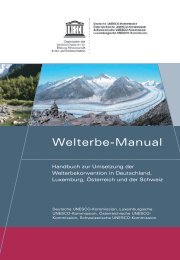Download - UNESCO Deutschland
Download - UNESCO Deutschland
Download - UNESCO Deutschland
Create successful ePaper yourself
Turn your PDF publications into a flip-book with our unique Google optimized e-Paper software.
edge as possible and produce the<br />
maximum public impact. The central<br />
steering body for the UN Decade in<br />
Germany is the National Committee<br />
set up by the German Commission<br />
for <strong>UNESCO</strong>. It brings together thirty<br />
experts and institutions, and is intended<br />
to represent the full spectrum<br />
of sustainability: members include<br />
Federal Ministries, such as the<br />
Education, Development and Environment<br />
ministries, alongside representatives<br />
from Parliament, the<br />
States or Länder, and NGOs, as well<br />
as from the media and from private<br />
enterprise. This broad composition<br />
ensures that planning and organisational<br />
decisions on the implementation<br />
of the Decade are made on the<br />
basis of the widest possible consensus.<br />
The Chairman of this body is the<br />
renowned German expert on education<br />
for sustainable development, the<br />
educational scientist Gerhard de<br />
Haan from the Freie Universität in<br />
Berlin. In order to further expand the<br />
number of stakeholders involved, the<br />
National Committee has invited 100<br />
further initiatives to take part in a<br />
UN Decade Round Table.<br />
What do we hope to achieve over<br />
the course of the UN Decade? This<br />
question is answered by the National<br />
Action Plan for Germany for the UN<br />
Decade of Education for Sustainable<br />
Development, which was drafted by<br />
the National Committee and the<br />
Round Table, and was presented to<br />
the general public in January 2005.<br />
The Action Plan sets four objectives<br />
which are to orientate the Decade<br />
activities in Germany:<br />
1. Further develop the concept of education<br />
for sustainable development<br />
and broadly spread good<br />
practices;<br />
2. Networking of stakeholders in education<br />
for sustainable development;<br />
3. Improvement of public awareness<br />
of education for sustainable development;<br />
4. Strengthening of international cooperation.<br />
(The Action Plan is also available in<br />
English at www.dekade.org).<br />
1961<br />
President Lübke<br />
at <strong>UNESCO</strong>. German<br />
President Heinrich<br />
Lübke pays an official<br />
visit to the Secretariat<br />
of <strong>UNESCO</strong> in<br />
Paris, and is received by<br />
acting Director-General,<br />
René Maheu (22nd June).<br />
In order to encourage the participating<br />
stakeholders to take more concrete<br />
measures, the political document<br />
of the Action Plan is supplemented<br />
with a so-called ‘Catalogue<br />
of Measures’. The Catalogue of Measures<br />
lists in detail the contribution<br />
which each stakeholder intends to Garden Kingdom of Dessau-Wörlitz<br />
Photo: Hans-J. Aubert<br />
29


